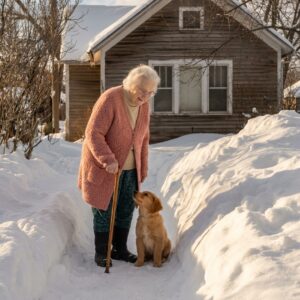For more than two decades, the old Victorian house at the end of Maple Street had been a mystery. Curtains always drawn, porch lights never on, and a woman everyone called Mrs. Halloway who never smiled or waved. She was the kind of neighbor who lived like a ghost among the living. But one cold Tuesday night, flashing red lights broke the stillness — an ambulance parked in front of her home. As the medics carried her out on a stretcher, she reached for my wrist with trembling fingers and whispered, “Please… don’t let my cat starve.” That single plea pulled me through a door that had been closed for 26 years — and into a story I would never forget.
Inside her house, time seemed frozen. Dust hung in the air like fog, furniture was draped in white sheets, and the faint scent of old wood filled every corner. Her cat — a thin orange tabby — led me to the kitchen, meowing desperately for food. After feeding her, I turned to leave… but something made me stop. In the dim light, I saw a grand piano under one of the sheets. When I pulled the cover away, a wave of memories seemed to come alive — sheet music covered in handwritten lyrics, and a black-and-white photograph of a glamorous young woman standing under a spotlight. My heart skipped a beat. I recognized that face. I had seen it on the cover of an old vinyl record my father once played — a famous jazz singer from the 1960s who had vanished without a trace.
The next morning, I visited her at the hospital. When I gently mentioned the photo, her eyes filled with both fear and relief. “I thought no one would ever remember me,” she whispered. She confessed that she once had everything — a voice people adored, a record deal, a dream. But behind the stage lights, her life had been darkened by a controlling husband who destroyed her career and drove her into hiding. When her marriage fell apart, she lost more than fame — she lost her daughter, too. “She blamed me for everything,” Mrs. Halloway said, tears streaking her cheeks. “I thought I was protecting her by staying silent. I was wrong.” For years, she lived alone, haunted by music no one heard anymore and a family she believed she’d lost forever.
When I finally tracked down her daughter, now a mother herself, she refused to see her at first. But when I brought Mrs. Halloway to her doorstep, frail and trembling, everything changed. Standing face to face after 26 years of silence, mother and daughter wept as a young girl — Mrs. Halloway’s granddaughter — peeked curiously from behind the door. It was the moment she had prayed for all those lonely nights. Two weeks later, Mrs. Halloway passed away peacefully, her cat curled beside her. At her funeral, her granddaughter sang the same song that had once made her grandmother famous — the melody that had waited 26 years to be heard again. And I realized then that sometimes, opening the right door doesn’t just change someone else’s life — it can also change your own.





